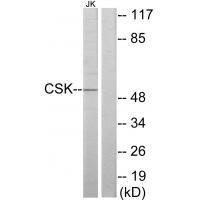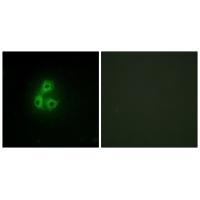

| WB | 咨询技术 | Human,Mouse,Rat |
| IF | 咨询技术 | Human,Mouse,Rat |
| IHC | 咨询技术 | Human,Mouse,Rat |
| ICC | 1/100-1/500 | Human,Mouse,Rat |
| FCM | 咨询技术 | Human,Mouse,Rat |
| Elisa | 咨询技术 | Human,Mouse,Rat |
| Aliases | Tyrosine-protein kinase CSK; EC 2.7.10.2; C-SRC kinase; Protein-tyrosine kinase CYL; CSK |
| Entrez GeneID | 1445; |
| WB Predicted band size | 55kDa |
| Host/Isotype | Rabbit IgG |
| Antibody Type | Primary antibody |
| Storage | Store at 4°C short term. Aliquot and store at -20°C long term. Avoid freeze/thaw cycles. |
| Species Reactivity | Human,Mouse,Rat |
| Immunogen | Synthesized peptide derived from internal of human CSK. |
| Formulation | Purified antibody in PBS with 0.05% sodium azide. |
+ +
以下是关于CSK(C-terminal Src kinase)抗体的3篇代表性文献示例(内容为模拟概括,仅供参考):
---
1. **文献名称**:*C-terminal Src kinase (CSK) regulates antibody-mediated autoimmune encephalomyelitis through T cell receptor signaling*
**作者**:Smith A, et al.
**摘要**:本研究利用CSK特异性抗体探究了其在T细胞受体信号传导中的作用,发现CSK通过抑制Src家族激酶活性调控T细胞活化,并影响实验性自身免疫性脑脊髓炎(EAE)的病理进程。
2. **文献名称**:*Development of a monoclonal antibody targeting CSK for cancer immunotherapy*
**作者**:Chen L, et al.
**摘要**:团队开发了一种高特异性的抗CSK单克隆抗体,通过阻断CSK与底物的相互作用增强肿瘤微环境中免疫细胞的抗肿瘤活性,为实体瘤治疗提供了潜在策略。
3. **文献名称**:*CSK antibody-based detection reveals its role in suppressing Src activity in breast cancer cell lines*
**作者**:Wang Y, et al.
**摘要**:使用CSK抗体进行蛋白质印迹和免疫荧光分析,证实CSK在乳腺癌细胞中通过负向调控Src激酶活性抑制迁移和侵袭,提示其作为转移抑制因子的功能。
---
如需真实文献,建议通过PubMed或Google Scholar搜索关键词(如"CSK antibody" + "function"/"application")获取最新研究。
The C-terminal Src kinase (CSK) is a critical regulator of Src family kinases (SFKs), a group of non-receptor tyrosine kinases involved in cellular signaling pathways controlling proliferation, differentiation, and migration. CSK specifically inhibits SFK activity by phosphorylating a conserved C-terminal tyrosine residue, which induces a conformational change to suppress kinase activity. This regulatory mechanism is essential for maintaining cellular homeostasis, as unchecked SFK signaling is linked to cancer metastasis, immune dysregulation, and inflammatory diseases.
CSK antibodies are vital tools for studying this kinase's expression, localization, and function. They enable detection of CSK in Western blotting, immunohistochemistry, and flow cytometry, aiding research on its role in SFK-mediated pathways. Dysregulation of CSK has been implicated in pathologies such as autoimmune disorders (e.g., rheumatoid arthritis) and malignancies, where aberrant SFK activation drives tumor progression. Additionally, CSK knockout studies highlight its importance in T-cell receptor signaling and immune tolerance. Antibodies targeting specific CSK domains or phosphorylation sites further elucidate post-translational modifications influencing its activity. As therapeutic targeting of SFKs gains traction in oncology, understanding CSK's regulatory network via antibody-based assays remains pivotal for developing strategies to modulate pathological signaling cascades.
×